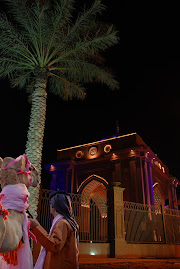
Tolerance is Also An Integral Part of Our National Identity | December 03, 2008 | The National
By Tala Al Ramahi
Xenophobia is an ugly thing for society to live with. And stereotyping any race or ethnic group is almost always the precursor to racial intolerance. As an Arab studying in America in a post-September 11 world, I was apprehensive that I would have to pay for the outrages that the Islamist extremists had perpetrated.
I would be lying if I said I faced prejudice or intolerance – most probably because my features did not match up with the images of Arabs in the American subconscious. The racial classifications I was subjected to were mostly harmless. To the US airport security official, I looked Eastern European (it was always comical to observe their changing facial expressions when they asked for my passport).
To our local café’s barista, I looked conspicuously Mexican – so much so that I had to mutter “No habla Espanol” in butchered Spanish for her to believe me. (Nevertheless, it took her almost a month to get over the fact that my big hair and wide set dark eyes had nothing to do with any secret Mexican ancestry.)
To my then just-made college friend, I was an oil princess. Our friendship went on to become very close and she now knows me better – although she is still a little disappointed that she will not be visiting my mansion on The Palm any time soon.
However, despite my own experience, I have known many an Arab who has been a victim of racial intolerance in the United States because their looks “gave them away”. Hindus and Sikhs have also been consistently mistaken for Muslims, and found themselves the victims of hate crimes because of their clothes and beards – as if that somehow defined a “Muslim” to the outside world.
Now that I am back home in the United Arab Emirates, I have become even more aware that our own society is not impervious to such typecasting either. For many of us, a Filipina now means “domestic servant”, while South Asian implies “labourer” or “taxi driver”.
To many Western expatriates, Emiratis are undeservingly rich and lazy, while some of us UAE nationals view the British expatriates as inconsiderate for their unwillingness to integrate into our society, learn our language, and respect our customs. The expression “when in Rome, do as the Romans do” seemingly does not apply to anywhere outside Europe.
Such stereotyping appalled me when I first returned. It was difficult to conceive that ideals of racial equality or – at the least – tolerance were eroding over here as well. The unsettling thing is how quickly one can become desensitised by the attitudes that surround us, so that not only do they not seem to be wrong any more, but one finds oneself slipping into them, too.
“It’s something you learn to live with. You don’t view it as racism when you understand the country’s dynamics.” That is how an acquaintance once explained the situation to a visiting American. It is when we find ourselves justifying such lamentable attitudes that we really need to look at ourselves and admit where we are going wrong.
The country’s 37th National Day yesterday marked the pinnacle of 2008: the year of National Identity. And as I saw Emiratis, Palestinians and, yes, Indians waving their UAE flags from their cars and on the city’s streets, it struck me that this country, the beacon of the Gulf and the calm haven among so many turbulent storms, would not be what it is today without them. All of them.
We need labourers to build our skyscrapers, and garbage cleaners to keep our streets clean, just as much as we need Western consultants to advise us on those issues where we still have modest experience. Which is exactly why tolerance should be an integral part of our national identity.
We are all so intricately dependent on each other in this country. And while the demographic imbalance has been a cause of concern for many of us Emiratis, who sometimes feel as if we are visitors within our own borders, we must also realise that it is only as a result of such peculiar demographics that we can afford the luxuries and the lifestyles we now take for granted.
We are also indebted to our Emirati forefathers, who had to battle the harsh desert environment to lay the foundations of our young country. Our founding father, Sheikh Zayed bin Sultan, established the vision we follow today through his unwavering beliefs in tolerance and generosity.
Today’s generation of young Emiratis need to remind ourselves of those beliefs as we follow the noble path that he set. We can do that best by respecting each other, tolerating our differences – and even learning from them.


No comments:
Post a Comment